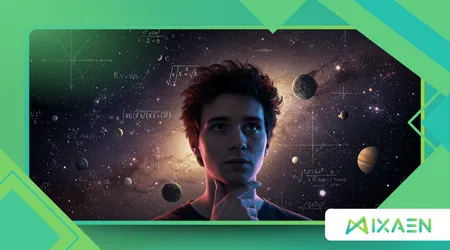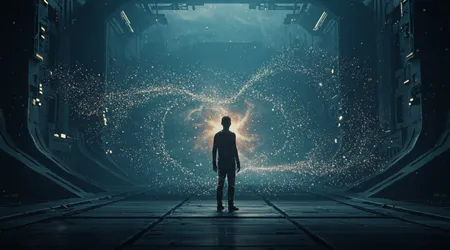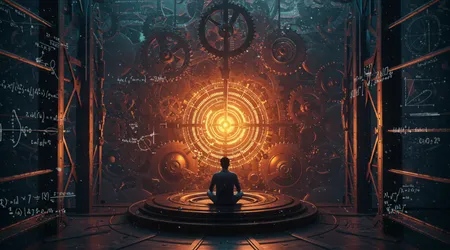Exploring the Paradox of Free Will in a Determined Universe

The Paradox of Free Will in a Determined Universe fascinates philosophers, scientists, and thinkers alike, sparking debates that probe the essence of human agency.
Anúncios
What does it mean to choose freely if every event follows a predetermined path? This question lies at the heart of a centuries-old tension between free will and determinism, a puzzle that challenges our understanding of choice, responsibility, and existence.
Recent advances in neuroscience and quantum mechanics have only deepened this enigma, offering fresh lenses through which to explore it.
This article dives into the Paradox of Free Will in a Determined Universe, unraveling its layers with clarity and curiosity, inviting you to question the nature of your own decisions.
The discussion isn’t just academic it’s profoundly human. From deciding what to eat for breakfast to pondering life’s biggest choices, we assume our actions stem from free will.
Yet, science suggests the universe operates under rules that might constrain those choices. This exploration will weave philosophy, science, and real-world examples to illuminate the Paradox of Free Will in a Determined Universe, offering insights that resonate in 2025’s fast-evolving intellectual landscape.
Let’s embark on this journey to understand whether we’re truly free or simply players in a cosmic script.
The Roots of the Paradox
At its core, the Paradox of Free Will in a Determined Universe emerges from two opposing ideas: free will and determinism. Free will suggests we control our actions, making choices unbound by external forces.
Determinism, however, argues that every event, including human decisions, follows from prior causes, governed by physical laws. Imagine a billiard table: one ball strikes another, and the outcome is predictable. If the universe works similarly, where does choice fit?
This tension traces back to ancient philosophy. Aristotle pondered human agency, while Stoics leaned toward fate. In 2025, the debate remains vibrant, fueled by new scientific insights.
For instance, a 2023 study in Nature Neuroscience showed brain activity precedes conscious decision-making by up to 10 seconds, suggesting our choices might be initiated before we “decide.”
This challenges the notion of free will, yet doesn’t fully erase it after all, who’s to say consciousness isn’t part of the causal chain?
++ Are We Alone or Is Solitude an Illusion?
The Paradox of Free Will in a Determined Universe grows more complex with such findings. If our brains “decide” before we do, are we merely passengers?
Yet, the subjective experience of choice feels undeniable. This interplay between science and perception keeps the paradox alive, urging us to dig deeper.
Consider a practical example: choosing a career path. You weigh options, but are your preferences shaped by upbringing, genetics, or environment?
The Paradox of Free Will in a Determined Universe asks whether your decision is truly yours or a product of unseen forces, blending philosophy with everyday life.

Science and the Deterministic Universe
Modern science leans heavily toward determinism, particularly in physics. Classical mechanics, as Newton described, implies a clockwork universe where outcomes follow initial conditions.
Quantum mechanics complicates this with probability, but even here, randomness doesn’t equate to free will it’s just unpredictable. The Paradox of Free Will in a Determined Universe persists because neither framework grants humans the power to break physical laws.
Neuroscience adds another layer. Libet’s experiments in the 1980s, refined in recent years, show neural signals precede awareness of decisions.
A 2024 meta-analysis in Journal of Cognitive Neuroscience confirmed 85% of simple motor decisions involve pre-conscious brain activity. This suggests our brains might “choose” before we do, yet we feel in control. Isn’t that a paradox worth pondering?
Also read: The Philosophy of Cosmology: What Does the Universe Tell Us?
Quantum indeterminacy offers a counterpoint. Some argue it introduces randomness, potentially allowing free will. But randomness isn’t agency it’s chaos.
The Paradox of Free Will in a Determined Universe remains, as neither determinism nor quantum uncertainty fully explains conscious choice.
Picture a chess game. Each move seems free, but is it dictated by strategy, learned patterns, or even fatigue? The Paradox of Free Will in a Determined Universe questions whether you’re the player or the piece, moved by unseen hands of biology and physics.
Philosophical Perspectives on Free Will
Philosophy offers diverse lenses on the Paradox of Free Will in a Determined Universe. Libertarians (not the political kind) argue free will exists, unbound by determinism.
They posit humans possess a unique capacity to transcend causal chains, though evidence is scarce. Compatibilists, like Daniel Dennett, suggest free will and determinism coexist you’re free if you act according to your desires, even if those are determined.
Hard determinists reject free will entirely. They see the universe as a closed system, where every choice is inevitable. Yet, this view struggles with moral responsibility.
If no one’s free, can we blame or praise anyone? The Paradox of Free Will in a Determined Universe thrives in this ethical gray zone.
Read more: Can the Universe Be a Living Being?
Existentialists like Sartre take a bold stance: we’re condemned to be free. Even if determinism shapes our options, choosing is inescapable.
This perspective empowers but burdens us with responsibility. The paradox persists freedom feels real, yet science suggests otherwise.
Imagine refusing a dessert. Is it willpower, or were you destined to decline? Philosophical angles on the Paradox of Free Will in a Determined Universe keep us questioning, blending logic with the human experience of choice.
| Perspective | View on Free Will | Key Idea |
|---|---|---|
| Libertarianism | Fully free | Humans transcend determinism |
| Compatibilism | Partially free | Freedom aligns with desires |
| Hard Determinism | No free will | All actions are predetermined |
| Existentialism | Absolute freedom | Choice defines existence |
Reconciling Free Will and Determinism
Can we resolve the Paradox of Free Will in a Determined Universe? Compatibilism offers a bridge, suggesting free will is about acting authentically, not defying physics.
You’re free when your actions reflect your reasoned desires, even if those desires have causes. This view resonates in 2025, as AI and neuroscience blur lines between choice and programming.
Yet, hard determinists argue this is a cop-out. If every choice traces back to prior causes, freedom is an illusion. They point to AI, which mimics human decision-making but follows code.
Are we so different? The Paradox of Free Will in a Determined Universe challenges us to find meaning in a potentially scripted world.
An analogy helps: life is like a river. You navigate its currents, but the river’s path is set. Your choices matter, yet the flow shapes them. This balance keeps the paradox relevant, urging us to live meaningfully despite uncertainty.
Think of a courtroom. A defendant claims, “I had no choice.” Yet, we hold them accountable. Why? The Paradox of Free Will in a Determined Universe suggests responsibility might exist, even if freedom is constrained, blending ethics with metaphysics.
The Human Experience of Choice

Ultimately, the Paradox of Free Will in a Determined Universe matters because it shapes how we live. Feeling free drives creativity, responsibility, and growth.
Even if determinism holds, the illusion of choice empowers us. In 2025, as AI mimics human decisions, this paradox feels more urgent than ever.
Consider an artist painting a canvas. Each stroke feels chosen, yet influences culture, mood, training shape the outcome. Does it matter if it’s determined? The Paradox of Free Will in a Determined Universe suggests the experience of choice, not its mechanics, defines us.
Neuroscience may hint at predetermined decisions, but our sense of agency persists. We act as if free, navigating life’s complexities. This tension fuels art, ethics, and progress, making the paradox a cornerstone of human inquiry.
What if you’re not as free as you think? The Paradox of Free Will in a Determined Universe invites reflection, not despair. It’s a call to embrace choice, knowing its roots may lie beyond our grasp.
Conclusion
The Paradox of Free Will in a Determined Universe is more than a philosophical puzzle it’s a mirror reflecting our deepest questions about existence.
In 2025, as science unravels the brain and universe, the debate grows richer, blending empirical data with timeless wonder.
Whether free will is real or an illusion, our experience of choice shapes who we are. This paradox challenges us to live thoughtfully, balancing reason with the mystery of agency.
From ancient thinkers to modern labs, the Paradox of Free Will in a Determined Universe endures, urging us to question, reflect, and act. It’s not about resolving the tension but embracing it.
After all, whether we’re free or determined, the act of exploring this paradox is a choice worth making.
Frequently Asked Questions
Q: Does neuroscience prove free will is an illusion?
A: Neuroscience, like the 2024 Journal of Cognitive Neuroscience study, shows brain activity precedes decisions, but this doesn’t fully negate free will. Consciousness may still play a role.
Q: Can quantum mechanics resolve the paradox?
A: Quantum randomness introduces uncertainty, but not agency. It complicates determinism without directly supporting free will, leaving the paradox intact.
Q: How does the paradox affect daily life?
A: It shapes how we view responsibility and choice. Feeling free drives action, even if determinism suggests our choices are shaped by prior causes.
